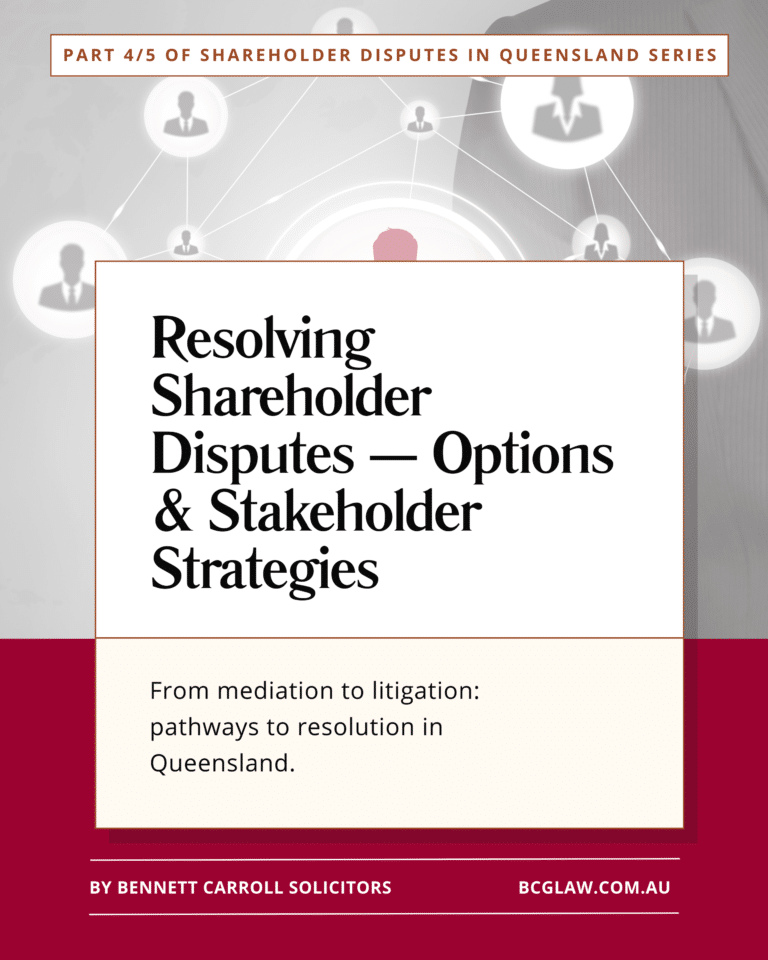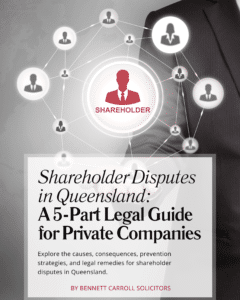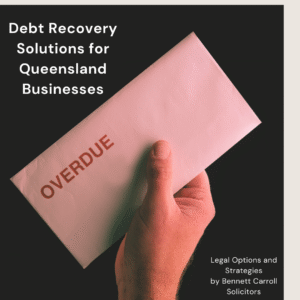Welcome to Part 4 of our 5-Part Legal Guide on Shareholder Disputes in Queensland.
In this series, we will explore the key aspects of shareholder disputes, with a focus on private companies in Queensland. Whether you’re a business owner, shareholder, or legal professional, understanding the common causes, legal frameworks, and resolution strategies for these disputes is essential for the stability and success of your business.
Explore the full series on Shareholder Disputes in Queensland:
Part 1: Causes, Impacts & Early Warnings
Part 2: Legal Frameworks & Shareholder Rights
Part 3: Prevention Strategies
Part 4: Dispute Resolution & Stakeholder Strategies
Part 5: Practical Tips & Recent Developments
Dispute Resolution Options for Shareholder Conflicts
When prevention fails and a dispute emerges, shareholders have several options for seeking resolution, ranging from informal negotiations to formal court proceedings.
Negotiation and Mediation
Direct negotiation between the disputing parties often represents the quickest and most cost-effective resolution path. This approach allows shareholders to maintain control over the outcome and preserve relationships.
Mediation involves an independent third party (mediator) who facilitates discussions between disputing shareholders to help them reach a voluntary agreement. Engaging in constructive dialogue with other shareholders can often lead to quick and cheap resolutions. This may include a compromise, or decision making delegated to a third party (where a deadlock cannot be resolved between the disputing parties). Shareholders may also attend mediation with the involvement of an experienced (sometimes, Court appointed) mediator.
The Queensland Courts system actively encourages mediation before proceeding to trial. Mediators do not impose decisions but help parties explore options and find common ground.
Arbitration and Expert Determination
Arbitration involves appointing an independent arbitrator who hears evidence and arguments from all parties and makes a binding decision. This process is generally faster and more private than court proceedings.
Expert determination may be appropriate for disputes involving technical matters or valuation issues. An independent expert with relevant expertise evaluates the issue and makes a determination that may be binding on the parties depending on the terms of reference.
Litigation and Court Proceedings
When other resolution methods fail, formal court proceedings may become necessary. In Queensland, shareholder disputes are typically heard in the Supreme Court.
Common court applications in shareholder disputes include:
- Oppression remedies seeking court orders to remedy unfair conduct
- Derivative actions brought by shareholders on behalf of the company
- Applications for winding up the company on “just and equitable” grounds
- Applications for specific performance of shareholder agreements
- Injunctions to prevent certain actions by the company or other shareholders
An application can be made to Court for the appointment of a liquidator who will then sell the assets or business of the company. The Court application is often made on the basis that it is just and equitable to liquidate the company. This may be so where the relationship between the shareholders has broken down to such an extent that there is no longer any mutual trust and confidence, and the business cannot properly function.
Strategic Considerations for Different Stakeholders
Different shareholders face distinct strategic considerations depending on their position within the company.
Minority Shareholder Strategies
Minority shareholders (those holding less than 50% of voting shares) often face unique challenges in disputes:
- Thoroughly review the company constitution and any shareholder agreements to understand rights and protections
- Document all instances of potential oppression or unfair treatment
- Seek to build alliances with other shareholders where appropriate
- Consider whether statutory remedies such as oppression claims may be available
- Evaluate the potential for negotiated exit at fair value
- Weigh the costs and benefits of formal legal action
Majority Shareholder Considerations
Majority shareholders hold significant power but must exercise it carefully to avoid legal challenges:
- Ensure all decisions comply with directors’ duties and don’t constitute oppression
- Maintain proper corporate governance processes and documentation
- Consider the legitimate interests of minority shareholders
- Evaluate whether buying out dissenting shareholders may resolve the dispute
- Balance control needs with legal obligations to all shareholder
Company Considerations
The company itself, as a separate legal entity, has interests that may differ from those of individual shareholders:
- Maintain business continuity during shareholder disputes
- Protect company reputation and stakeholder relationships
- Consider disclosure obligations and information management
- Evaluate impacts on employees, customers, and suppliers
- Assess financial implications of dispute resolution options
Next > Part 5: Practical Considerations and Recent Legal Developments | Shareholder Disputes in Queensland Series
Concerned about potential disputes? Contact Bennett Carroll Solicitors for expert legal advice on shareholder conflicts in Queensland. Our expert Commercial Lawyers are here to assist you. With offices across Brisbane, Gold Coast, Sunshine Coast, and Ipswich, we’re ready to help. Contact Bennett Carroll Solicitors today.
External resources:








